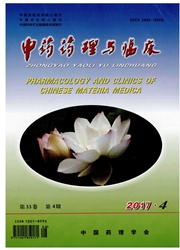

 中文摘要:
中文摘要:
目的:探讨肿节风总黄酮含药血浆对大鼠骨髓巨核细胞增殖及TPO、TGF—β1含量的影响。方法:分别一次性灌胃给予SD大鼠肿节风总黄酮O.39、2.0g/kg,于给药后20、40、60min眼眶取血收集肿节风总黄酮含药血浆。采用兔抗大鼠血小板相关抗体(稀释倍数为128倍)建立大鼠骨髓巨核细胞增殖障碍模型,考察肿节风总黄酮0.39、2.0s/kg含药血浆对大鼠骨髓巨核细胞增殖及培养上清液中TPO、TGF-β1含量的影响。结果:(1)兔抗大鼠血小板相关抗体可显著降低大鼠骨髓巨核细胞增殖;相对于空白血浆组,肿节风总黄酮0.39、2.0g/kg含药血浆可显著促进大鼠骨髓巨核细胞的增殖。(2)兔抗大鼠血小板相关抗体可显著降低大鼠骨髓巨核细胞培养体系中TPO含量,显著增加TGF-β1含量;相对于空白血浆组,肿节风总黄酮0.39、2.0g/kg含药血浆可显著增加大鼠骨髓巨核细胞培养体系中TPO含量,显著降低TGF-β1含量。结论:肿节风总黄酮0.39、2.g/kg含药血浆可显著促进大鼠骨髓巨核细胞的增殖,可能与增加大鼠骨髓巨核细胞培养体系中TPO含量,降低TGF-β1含量等有关。
 英文摘要:
英文摘要:
Objective: To observe the effects of serum containing flavonoids sarcandrae on the proliferation and TPO, TGF-β1 levels of rat bone marrow megakaryoeytes. Methods: SD rats were administrated flavonoids sareandrae at the doses of 0.39 g/kg and 2.0 g/kg for once. At the time of 20, 40, 60 rain after administration, the serums containing flavonoids sareandrae were collected. The proliferation disorder model of rat bone marrow megakaryocytes was established by using rabbit anti-rat platelet associated antibody. The effects of serum containing fla- vonoids sareandrae at the doses of 0.39 g/kg and 2.0 g/kg on the proliferation of rat bone marrow megakaryocytes and the levels of TPO and TGF-β1 in the culture supernatants. Results: (1) The platelet associated antibody could significantly reduce the proliferation of rat bone marrow megakaryocytes ( P 〈 0.05 ). Compared with the serum of normal rat, the serums containing flavonoids sarcandrae at the doses of 0. 39 g/kg and 2.0 g/kg could significantly promote the proliferation of rat bone marrow megakaryocytes ( P 〈 0.05 ; P 〈 0.01 ). (2) The plate- let associated antibody could significantly decrease TPO level in the culture supernatant, but significantly increase the level of TGF-β1 ( P 〈 0. 01 ). Compared with the serum of normal rat, the serums containing flavonolds sarcandrae at the doses of 0. 39 g/kg and 2.0 g/kg could significantly increase the level of TPO in the culture supernatant, but decrease the level of TGF-β1. Conclusion: The serums containing flavonoids sarcandrae at the doses of 0.39 g/kg and 2.0 g,/kg could significantly promote the proliferation of rat bone marrow megakaryocytes, which may be associated with regulating the levels of TPO and TGF-β1 in the culture supernatants.
 同期刊论文项目
同期刊论文项目
 同项目期刊论文
同项目期刊论文
 期刊信息
期刊信息
